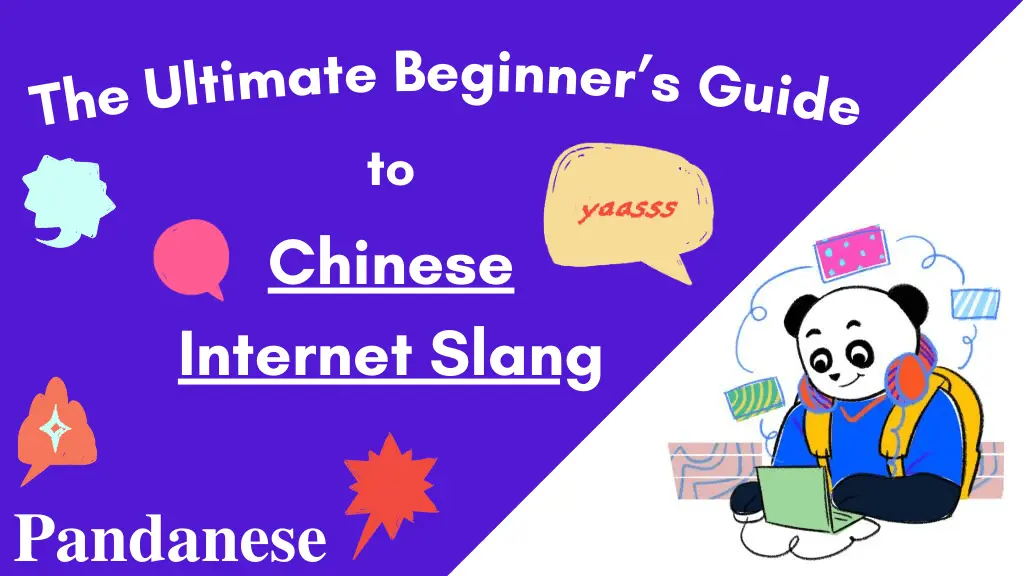
The Ultimate Beginner’s Guide to Chinese Internet Slang for 2023
How much Chinese internet slang do you know?
For non-Chinese natives, Chinese slang can be overwhelmingly confusing, especially with the amount of slang being used in today's world. If you want to put your understanding of Chinese slang to the test, watch this video and see how much you can understand!
When you try to understand Chinese internet slang
Why use Chinese internet slang words?
Chinese internet culture is particularly interesting. And netizens love coming up with ingenious abbreviations and acronyms to spice up mundane daily internet conversations. You might even be surprised to find out that young people are not the only ones using Chinese slang but also older generations as well.
Various internet slang has made its way into real-life conversation and has become an important part of Chinese culture.
If you are unfamiliar with Chinese internet culture or are not native, you most likely have struggled to understand what your Chinese friends and other Chinese netizens are saying on the internet. Moreover, with the ever-evolving Chinese internet slang, you will need to be on the internet constantly to keep up.
Do you want to impress your Chinese friends and learn Chinese internet slang most commonly used by Chinese people? If you want to know how to communicate effectively with other netizens on the internet and sound like a native, we've got your back.
Here is a list of the 8 most commonly used Chinese internet slang words that are popular with Chinese netizens. We'll also help you understand the origins of these Chinese slang phrases.
Chinese internet slang for 2023
1. 单身狗 (dān shēn gǒu)—someone who is single

单身狗 (dān shēn gǒu) meme, Clinic Med Translation: I am a single dog
The literal meaning of this Chinese slang, 单身狗, is "single dog." But it doesn't refer to a literal dog, but someone who is single.
This internet slang was one of the earliest and most frequently used in 2011 when China entered the digital age. Many Chinese internet users were of marriageable age during this time but had not yet found a compatible romantic companion.
While there is no single source of where this phrase came from, people commonly used this slang to mean "dog," a derogatory yet humorous word. This word became part of the Chinese internet slang as more people started welcoming self-deprecating humor in daily conversations.
An example of how to use this would be "我这么老了还没女朋友,还是单身狗。(wǒ zhè mè lǎo le hái méi nü péng yǒu, hái shì dān shēn gǒu)" which translates to "I'm so old, and yet I have no girlfriend. I'm a single dog."
2. 给力 (gei lì)—outstanding

给力 (gei lì) face meme, QQ Translation: Awesome
給力 is another commonly used Chinese internet slang that first appeared during the 2010 World Cup. Chinese people use this slang to describe an impressive action, event, or person.
It literally translates to "provide" and "power," and the phrase means "putting in the extra effort."
Spoiler alert for the 2022 World Cup. For example, you might use "阿根廷太给力了。(ā gēn tíng tài gěi lì le)," which means that Argentina has done exceedingly well.
On the other hand, you could also add a 不 (bù) in front to indicate the opposite of 给力. For example, "墨西哥太不给力了。(mò xī gē tài bù gěi lì le)"—meaning that Mexico had an underwhelming performance.
3. 绿茶 (lǜ chá)—green tea bitch

绿茶 (lǜ chá) spitting gif, ASQQL Translation: Tsk, green tea!
The green tea chinese slang is 绿茶 or 绿茶婊.
It is an internet buzzword that refers to a girl who acts innocent but is actually manipulative. 绿茶 translates to green tea, a common beverage consumed by the Chinese. It represents a pure image. Meanwhile, 婊 literally means "bitch." Together, this Chinese internet slang describes a seemingly charming and innocent woman who is, in fact, materialistic and scheming.
This phrase was popularized during an incident in 2013 where a supermodel was found sleeping with others for money and fame. This slang was originally used to describe innocent supermodels who seemed to lead glamorous lives but were putting up an act to gain pity.
After that, this Chinese slang phrase started to describe other women who acted similarly—like a wolf in sheep's clothing.
4. YYDS 永远的神 (yǒng yuǎn de shén)—the GOAT

League of Legends player, Uzi, as god, Quora Translation: Uzi! YYDS!
The most equivalent of yyds meaning is Have you heard of the English internet slang GOAT (greatest of all time).
The Chinese equivalent of this would be 永远的神. 永远的神 translates literally to "eternal God." This phrase can be used to describe somebody who is amazing at what they do. While the slang originated with League of Legends, it is not limited to the gaming industry.
This phrase was first coined by a streamer who was impressed by Uzi’s skills as a professional League of Legends player. During his stream, he said, "乌兹,永远的神 (Uzi, the eternal God." Uzi's fans then started using this phrase whenever Uzi was competing during a League of Legends game. Then this became mainstream in China.
An example of how you can use this term would be "李小龙是永远的神。(lí xiǎo lóng shì yǒng yuǎn de shén)," which translates to "Bruce Lee is the legend."
5. 网红 (wǎng hóng)—internet influencer

网红 (wǎng hóng) meme, Fabiaoqing Translation: Why aren't you replying to me? Are you an influencer?
网红 refers to internet celebrities or key opinion leaders. This phrase is an abbreviation of 网络红人 (wǎng luò hóng rén)—which literally means "internet red person."
If you are familiar with the Chinese language or culture, you would know that 红 is an auspicious color symbolizing prosperity. Similarly, 红 in this context refers to the influencer's popularity.
Again, there is no single origin of this phrase. However, you could trace it back to when the first Chinese social media platform, SixDegrees.com, was launched in 1997, with functions similar to FaceBook.
Today, this phrase is commonly used to describe influencers across all social media platforms like Weibo, Xiao Hong Shu, Dou Yin (Chinese equivalent to TikTok), YouTube, etc.
6. 打卡点 (dǎ kǎ diǎn)—popular photo spot

打卡点 (dǎ kǎ diǎn) meme, meme.tw Translation: You forgot to take a photo at the popular tourist/Instagram spot
Another Chinese internet slang you might find commonly used with 网红 would be 打卡点. 打卡 originally came from the workplace, where workers had to clock in and out during office hours. This action was done by tapping their cards (also called 卡 in Mandarin) on a machine.
Later, this phrase 打卡 became a commonly used Chinese internet slang to describe a reminder of the good habits that one has developed—such as a fitness or learning check-in. Since 点 means a place, a 打卡点 would refer to a place where people would want to "check-in" at.
Most of the time, influencers frequently visit these places to take aesthetic-looking photos for their social media. 打卡点 can also be used to describe a touristy spot where most people take their photos.
Chinese number slang words
7. 3Q (sān Q)—thank you

Different ways of saying Thank You in Mandarin, Giulia Carbone •蕾啦• Translation: Different ways of saying Thank You in Mandarin
"Xiè xiè (thank you)" is out. The new and modern way is to use 3Q, a commonly used Chinese slang.
3Q is relatively easy to understand. Simply say "three" in Mandarin and the letter "Q." This phrase is phonetically similar to how "thank you" sounds.
Like "xiè xiè," a common way to express gratitude, 3Q sounds more playful and is frequently used in informal conversations.
Similar to 单身狗, there is no single origin to this internet slang.
8. 88 (bai bai)—"goodbye"

88 (bai bai) meme, SOGOU Translation: 88~Talk next time!
Last but not least, you should also know what 88 means as a Chinese number slang. This internet slang in Mandarin is pronounced as bā bā, which sounds very similar to the phrase "bye-bye."
Just like 3Q, Chinese netizens use phonetics to play with Chinese slang terms. There are other slang words that play around with numbers, just like 88, but that is a topic for us to discuss another day.
If you see "886," it has the same meaning as 88. The only difference is that the "6," pronounced as "liù" in Mandarin, sounds slightly more casual than 88.
In closing
Now that we've gone through the popular Chinese slang words used by almost every single Chinese person with internet access, you can now speak like a native on the internet.
These slang words, however, are definitely not exhaustive, as slang and Chinese memes come and go quickly. But what's beautiful and amazing about the Chinese language is how we can play around with the characters to create new Chinese slang every day. To learn Chinese effectively, one must not limit oneself to what is taught in the classroom or in Chinese textbooks. We must expose ourselves to modern-day Chinese phrases that are used in daily conversations.
Now go ahead and try using a new Chinese slang you've learned through this guide. We bet in no time you'll be speaking like a Chinese native.
Good luck!
PS: Want to learn more Chinese slang terms? Check out this helpful YouTube video:
20 Chinese Slang You Need to Know
Jing You is a Chinese native who grew up in the Fujian province and soaked in the Chinese culture while living with her grandparents. She later moved to Singapore to pursue further education. However, she has always been passionate about the Mandarin language despite being in an environment that speaks English predominantly. She was involved in multiple Mandarin and Chinese culture programmes in schools, and brought this passion forward by tutoring elementary school students Mandarin in her adulthood.
The easiest way to learn Chinese & build vocabulary

